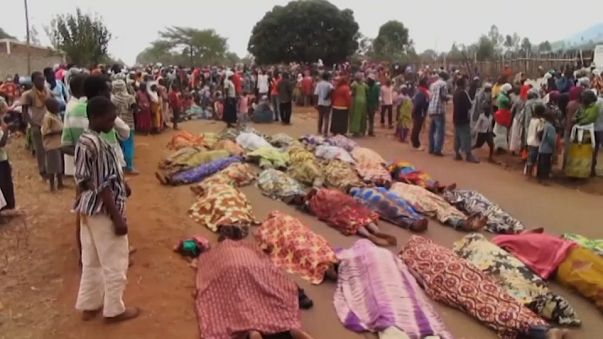By ELOGE WILLY KANEZA
Associated Press
 |
| Archive Photo |
BUJUMBURA, Burundi (AP) - Twenty-six people were killed and seven others wounded in an attack in a rural area of Burundi, the country's security minister said Saturday, calling it the work of a "terrorist group" he did not identify.
Speaking at the scene, Alain Guillaume Bunyoni told reporters that 24 people were killed in their homes Friday night and two others died of their wounds at a local hospital.
He gave no further details about the attack in the Ruhagarika community of the rural northwestern province of Cibitoke.
The attack came shortly before Burundians vote May 17 in a controversial referendum that could extend the president's term. It was not immediately clear if the attack was related.
One survivor told The Associated Press the attackers came around 10 p.m. local time and "attacked households and set fire on houses." Some victims were hacked with machetes and others were shot or burned alive, she said.
Her husband and two children were killed, she said. She spoke on condition of anonymity, citing safety concerns.
This East African country has seen deadly political violence since early 2015 when President Pierre Nkurunziza successfully pursued a disputed third term. An estimated 1,200 people died.
Now Burundians are being asked to vote on a proposal to extend the president's term from five years to seven, which would allow Nkurunziza to rule for another 14 years when his current term expires in 2020.
Campaigns ahead of the referendum have been marred by hate speech, with one ruling party official sent to prison after he called for those who oppose the referendum to be drowned.
The United States earlier this month denounced "violence, intimidation, and harassment" against those thought to oppose the referendum and expressed concern about the "non-transparent process" of changing the constitution.
Human Rights Watch has noted "widespread impunity" for authorities and their allies, including the ruling party's youth wing, as they try to swing the vote in the president's favor.
Many in Burundi, a poor country that still relies heavily on foreign aid, worry that a new round of bloodshed will follow the referendum no matter its results.
Already more than 400,000 people have fled the country since the political unrest began in April 2015, according to the United Nations.
Nkurunziza, a former rebel leader, rose to power in 2005 following the end of Burundi's civil war that killed about 300,000 people. He was re-elected unopposed in 2010 after the opposition boycotted. He said he was eligible for a third term in 2015 because lawmakers, not the general population, chose him for his first term.
Follow Africa news at https://twitter.com/AP-Africa






